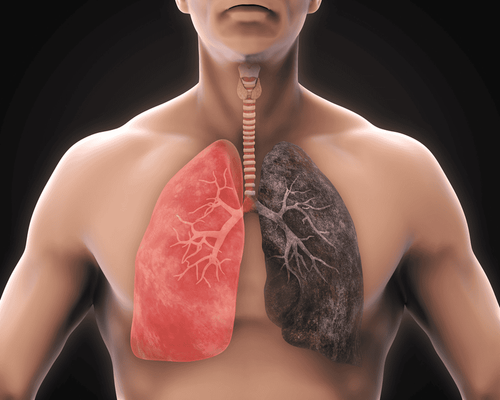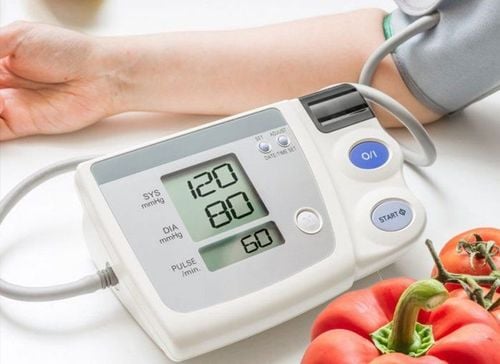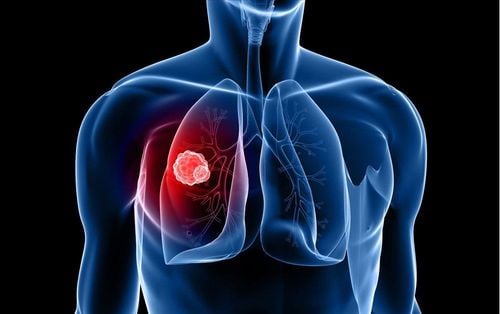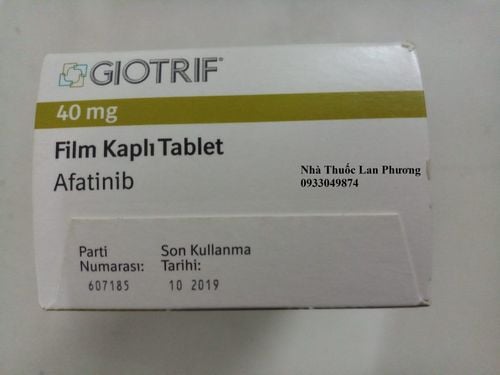This is an automatically translated article.
Lung cancer is a condition in which cells in the lungs divide uncontrollably, causing tumors to develop that impair the ability to breathe. Diagnosing lung cancers at an early stage can be difficult because their symptoms are similar to respiratory infections or there are no specific warning symptoms.
1. What is lung cancer like?
Lung cancer is cancer that starts in the lungs. The disease, which occurs when cells in the body begin to grow out of control, is the leading cause of cancer death in the United States in both men and women.
Smoking causes the majority of lung cancers (both smokers and those exposed to secondhand smoke). However, lung cancer can also occur in people who have never smoked and are never exposed to secondhand smoke. In this case, there may not be an obvious cause of lung cancer.
Causes lung cancer by smoking by damaging the cells lining the lungs when inhaled smoke is full of carcinogens. At that time, lung tissues begin to change. Initially, the body can repair this damage, but with repeated exposure, the normal cells lining the lungs become increasingly damaged. Over time, this damage causes the cells to function abnormally and the cancer begins to progress.
Lung cancer has two common types:
Small cell lung cancer. This type occurs in heavy smokers and is less common than other types of lung cancer. Non-small cell lung cancer. This type of lung cancer includes squamous cell carcinoma, adenocarcinoma, and large cell carcinoma. Lung cancer usually doesn't cause signs and symptoms in its early stages. Symptoms of the disease only occur as the disease progresses. Some common signs of lung cancer include: Persistent cough, coughing up blood (small amounts of blood), shortness of breath, chest tightness, hoarseness, unexplained weight loss, bone pain, headache.
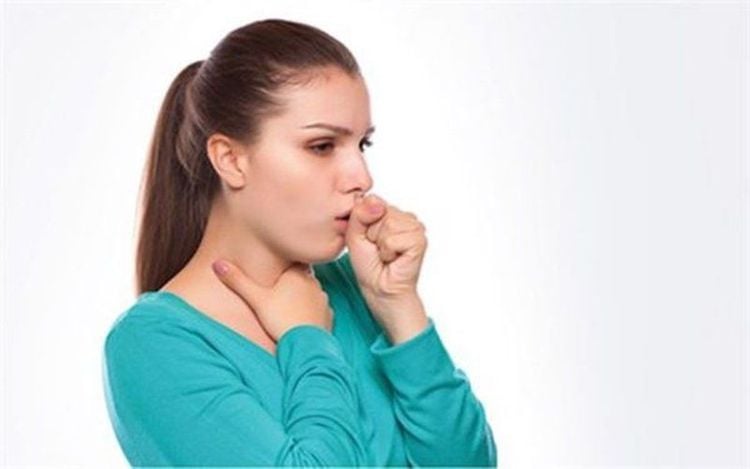
Ho liên tục có thể là triệu chứng của ung thư phổi
2. Lung cancer risks: rumors and facts
2.1. It's too late to get lung cancer if you've smoked for many years Quitting smoking has an almost immediate benefit to lung cancer. The circulatory system will improve and the lungs will function better. The risk of lung cancer will begin to decrease over time. Ten years after giving up the habit, the risk of dying from the disease was reduced by 50% compared with those who continued to smoke.
2.2. Low or light tar cigarettes are safer than other types Some studies show that menthol cigarettes can be more dangerous and harder to give up. So be careful with menthol-based medicines. Due to the cool feeling of mint, it makes smokers inhale more deeply and will adversely affect the lungs.
2.3. It's okay to smoke from a jar Smoking marijuana can increase the risk of lung cancer. Many people who use jars to smoke cigarettes are also at high risk of disease. Some studies suggest that people who use both methods may be more likely to develop lung cancer.
2.4. Add antioxidants for protection When researchers tested this product, they unexpectedly found a higher risk of lung cancer in smokers who used beta-carotene. However, the antioxidants from fruits and vegetables are very effective.
2.5. Cigarettes and cigars pose no problem Just like cigarettes, they put the user at risk for cancers of the mouth, throat, esophagus and lungs. Cigar smoking, in particular, makes the body more likely to suffer from heart disease and lung disease.
2.6. Smoking is the only risk for lung cancer Smoking is one of the biggest risk factors for lung cancer. However, there are non-smokers who still get the disease. This shows that lung cancer can be caused by other risk factors such as: smoking, occupational exposure, genetics can all cause lung cancer. The second cause of lung cancer is an odorless radioactive gas (radon). This gas is found in rocks and soil, and it can seep into homes.
2.7. Talcum powder causes lung cancer Research shows no clear link between lung cancer and accidental inhalation of talcum powder. People who work in environments exposed to other chemicals such as asbestos and vinyl chloride are also more likely to get sick.
2.8. If you have lung cancer, it makes no sense to quit smoking If you quit smoking with lung cancer, the treatment will work better and the side effects may be milder. In the event that surgery is needed, people who have quit smoking tend to heal better than current smokers. If radiation therapy is needed for laryngeal cancer, people who quit smoking are less likely to have hoarseness. Importantly, giving up smoking makes a second cancer less likely to start.
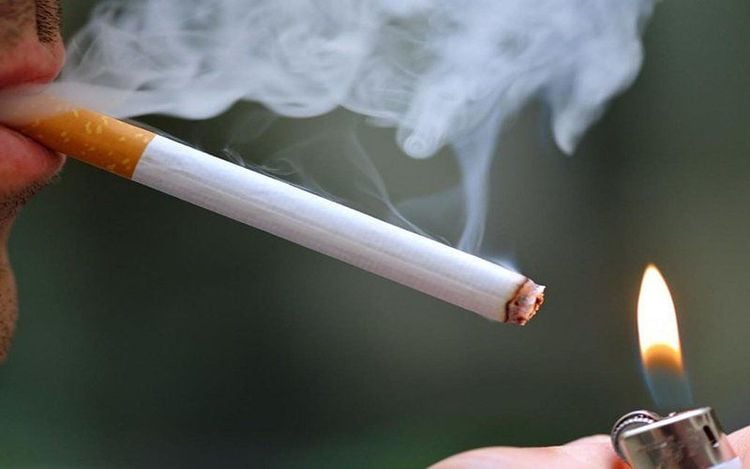
Ngừng hút thuốc lá để điều trị ung thư hiệu quả hơn
2.9. Exercise has no effect on disease risk People who are physically active may be less likely to get lung cancer. Studies show that exercise helps your lungs function better and also prevents heart disease, stroke, and many other serious conditions.
2.10. Air pollution causes lung cancer Tobacco is the biggest threat to lung cancer, but air pollution is also a high risk factor. People who live in areas with polluted air are more likely to develop lung disease than people who live in areas with clean air. Many major cities have cut air pollution in recent years, but levels are still very dangerous for people living in this region.
3. Prevention of lung cancer
There is no sure way to prevent lung cancer, but to reduce your risk:
Stop smoking: If you've never smoked, never start. Quit smoking: Quitting smoking immediately will help your condition as well as your health improve better. Avoid passive smoking Check your home for radon Avoid carcinogens at home and work Eat a diet full of fruits and vegetables Exercise regularly Lung cancer is at the top of the list in the list of 10 common types of cancer in both sexes. Every year more than 20,000 people get sick, of which up to 17,000 people die. It is worth mentioning that most people with the disease are detected too late and die after only 6 months to 1 year. Therefore, detecting and treating the disease at an early stage will provide a higher chance of survival for patients diagnosed at a late stage.
Currently, the International General Hospital is implementing a lung cancer screening package. When registering for the Lung Cancer Screening Package, customers will receive:
Examination and consultation with an oncologist. Lung cancer screening through low-dose CT Scanner for lung tumor screening. With a team of highly qualified doctors, having many years of consulting and treating lung cancer, will bring good results to satisfy customers.
Customers wishing to be examined at Vinmec International General Hospital can register for examination at Vinmec Hospitals and Clinics nationwide HERE.
References: mayoclinic.org, webmd.com




